#illthids have two sides to them
Explore tagged Tumblr posts
Text
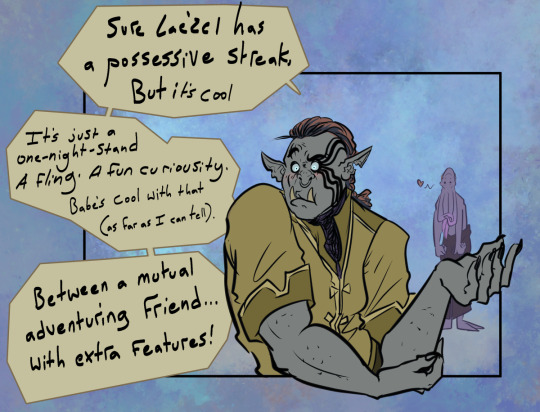
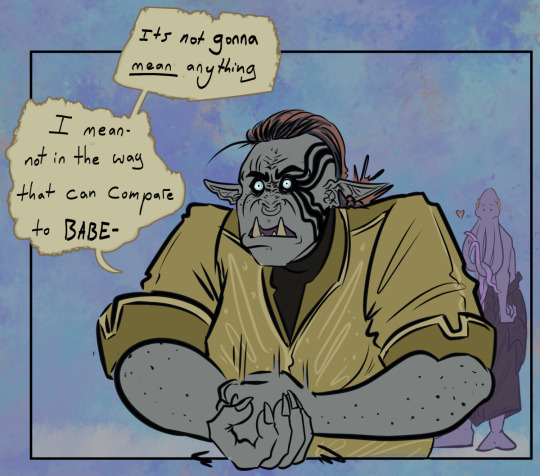
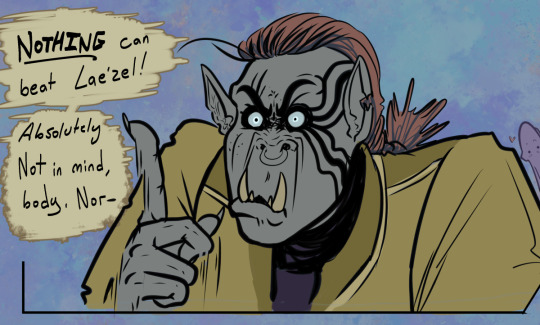
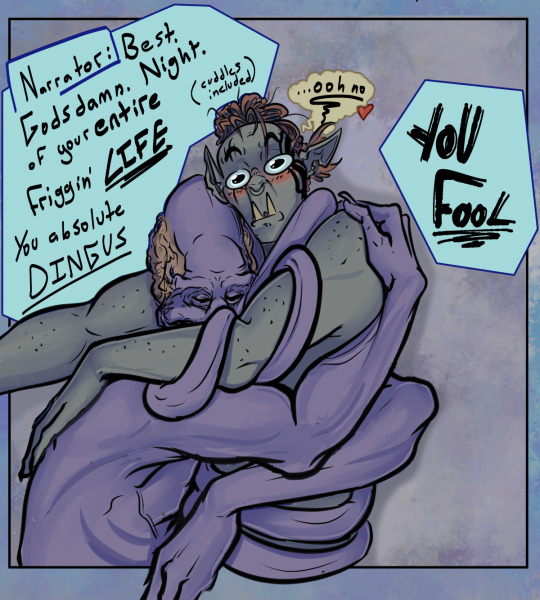
Shirtless Disaster pt 1 and Shirtless Disaster pt 2
At one point, while decision-making, I tried. real hard. not to have a conflict of interest.
But uuhh...Apparently the game said 'Nah, Greygold's in friggin' love with two people now', So- ¯\_(ツ)_/¯
This is Greygold's life now!
#bg3 spoilers#baldur's gate 3#bg3#the emperor bg3#bg3 emperor#Greygold#bg3 comic#bg3 fanart#YOU THINK I'M DONE TALKING ABOUT SHIRTLESS SQUID?#YOU THOUGHT WRONG#I apologize for the amount of shirtless squid that's going to be happening for the next indeterminable amount of time#AND HOPEFULLY THIS ISN'T CONSIDERED MATURE#PRETTY SURE I COVERED ALL THE GO-TO-HORNY-JAIL BITS#illthids have two sides to them#they can be your mindflayer or your mindblower~
499 notes
·
View notes
Text

In Defense of The Emperor (or, Ansur Is Not A Victim)
GIF credit: @mittthrawnuruodo
The Emperor is, in my opinion, one of the most underappreciated and misunderstood characters in Baldur's Gate 3, and I have spent a lot of time thinking about reasons why that may be. I honestly think it's tragic because The Emperor is such a compellingly-written character, and I think a lot of that gets lost under the landslide of abject hatred people feel for it.
I have a lot of thoughts about this, so buckle up buttercups! Lots (and lots, and LOTS) more under the cut!
I was playing BG3 again the other day, as one does, and was working my way through Emp's reveal, its initial withholding of the details about its escape and the nature of its relationship with Stelmane, and all the Ansur stuff, and I got fired up about this again. I don't think I'll ever stop getting fired up about The Emperor, to be honest pffffff.
There are a few really common reasons I see for why people hate The Emperor. One is its manipulative behavior, lies by omission, and the fact that if you pressure it enough, its attitude toward Tav will change. Another is the fact that if you choose to free Orpheus it will willingly return to the Netherbrain. Then there's its enthrallment of Stelmane and the implication that it led to her illness and death. And, of course, there's the idea that The Emperor betrayed its longtime friend and implied former lover, Ansur.
I also think there's a secret fifth option that maybe happens unconsciously. The vast majority of people spent a lot of time crafting their Dream Guardians into gorgeous feasts for the eyes, which is something the devs intentionally encouraged players to do. So when the game hit them with the twist and their beautiful Dream Guardian was replaced by an (ostensibly) unappealing Illithid, their sense of betrayal was amplified; they were predisposed to greater anger and hatred for The Emperor than they may have felt if it had retained the pleasant visage of their Dream Guardian.
Emp's Manipulation:
I find the argument about Emp's lying and manipulative behavior a little strange, when, for example, so many people are willing to overlook Astarion's abject manipulation of their Tavs. Personally, I think the reasons here are twofold. One, Astarion enjoys the privilege of being conventionally attractive and Emp does not, plain and simple. Two, sticking it out through Astarion's lying and manipulation will eventually lead to satisfying gain: an endgame relationship with him. There's no such satisfying outcome with Emp, so players are less inclined to put up with behaviors they endure for Astarion's sake. It's actually arguably easier to get Emp to admit to its manipulation of Tav than it is to get Astarion to do the same thing, and yet Astarion is more readily forgiven.
There may also be some degree of people being skeeved out by Emp's mind reading and its apparent ability to enthrall. But even this is a little odd, since Tav and their companions are all telepathically joined and that doesn't scare the player. The Emperor also never actually makes an attempt to enthrall Tav even when they're being combative and resistant. My only conclusion is that player distaste in this context is a product of the negative narratives about Illithids throughout the game. Which, for the record, are narratives I think we're meant to challenge as players.
(As an interesting side note, those narratives seem to be easily overriden when an Illithid is seen as helpful, as in the case of Omeluum. Despite clear evidence that it has not entirely denounced Illithid culture, and despite its membership in a morally questionable organization, players have a largely positive opinion of Omeluum simply because it tries to help them. They seem to forget that it was experimenting on Tav, and its miscalculation could have seriously compromised them.)
I think it's also worth pointing out that an Illthid in hiding is going to find particular challenge in simply surviving and remaining undetected, and even moreso in avoiding being attacked and killed, especially if it does not have the benefit of allies. Even Omeluum (who has the benefit of allies in the Society of Brilliance) has to disguise itself when it moves about the city. If you visit Omeluum and Blurg in Baldur's Gate you can listen in to their conversation, and Omeluum admits it sometimes takes the form of Blurg when it goes around.
I staunchly maintain, for one thing, that Emp is a true neutral character. It will resort to nearly any means necessary to assure its survival and freedom - though, again, it does stop short of robbing Tav of their autonomy, which I think is significant. And really, all things considered, Emp's methods are some of the least insidious when compared with the behaviors of other notable characters in the game. Even its insistence that Orpheus must be kept imprisoned is driven more by fear and a lack of real alternatives than any kind of malice. And alignments aside, when you consider the attitudes people have about Illithids, it's suddenly not surprising that Emp resorts to things like lying to protect itself and convince others to ally with it.
This concept was something I had to explore in depth when I worked with a DM friend who helped me construct a playable Illithid character, and I was challenged to run with a party of adventurers without them discovering my true race. It is NOT EASY. Almost immediately, despite my best intentions, I realized I would likely need to resort to some questionable methods to maintain my character's secrecy. The Emperor is the same. I'll touch on this more when I get into Emp's dynamic with Stelmane.
Player Influence:
Maybe the most frustrating observation I've made is that The Emperor is one of the only characters players will typecast based on the worst potential dialogue outcomes. Tav's relationship with pretty much all of the characters can be either improved or totally soured by the dialogue options they select. In most cases players are able to make the distinction that their choices are what influence the attitudes of the characters they're interacting with. But in the case of The Emperor, players will refuse to believe that any positive interactions with it are genuine because there are dialogue paths that lead to negative outcomes. I have to wonder why this standard does not apply to companion characters who break up with Tav, treat Tav questionably, or leave the party altogether when the player selects negative dialogue options.
Because of the potential for the Emperor's attitude to sour and for it to turn away from the player, it is written off as an entirely disingenuous character. However, Emp repeatedly demonstrates a capacity for veracity and emotionality, and I believe that when you foster a positive relationship with it the feelings it shares are genuine, just like with any other character. I'm guessing it doesn't help that Emp can be very matter-of-fact and pragmatic even during positive interactions, where the companion characters are often downright poetic in their regard for Tav and willing to make sacrifices for Tav when their approval is high.
I can see how this would give the sense that Emp's feelings are lesser, because it brackets those feelings with discussions about things like whether Tav is embracing tadpole abilities. But 1) Emp stands to lose its freedom again if the conflict with the Elder Brain goes awry and is, I think very understandably, preoccupied with what it believes are the necessary steps to ensure victory, and it seems anxious to affirm that Tav is as dedicated to the best outcome as it is. And 2) if this kind of pragmatism is the barometer by which people are measuring their trust of a character's feelings about them, I'm honestly a little afraid to know how they feel about their interactions with very pragmatic people IRL. 👀
Some people just are less prone to emotional expressiveness, or will ease their discomfort around emotional expression by diverting conversation to more practical matters. That doesn't mean the feelings they express are not genuine. We see over and over that Tav has a way of awakening strong, unexpected feelings in the people they meet throughout the course of the game. There's every possibility that this is what happens with Emp, and that it is taken aback by its feelings and is steering the conversation back to the matter of the conflict with the Brain as a way of avoiding being caught up and losing the plot.
I think that because the game does such a good job of playing up the idea that Illithids are soulless and inherently manipulative and evil, players are overly willing to accept it as fact. However, the game does also give us opportunities to question that narrative, and I think we'd do well to seize those opportunities. Even in raw DnD Illithid lore has shifted toward the idea that Illithids are more than the vicious monsters they started as. I think it's far more compelling and creative to consider that Emp is being genuine when you pursue positive interactions with it.
Relationship with Stelmane:
This begs the question, then, of whether the Emperor is truly upset about Stelmane's death. It certainly seems to be, but when you begin to suspect that it was enthralling her and forcing her to do its bidding you begin to doubt that it really cared about her.
Honestly? I'm not sure whether it did or not. Perhaps what it's truly upset about is the realization that it no longer has the option to return to its previous life as a major player in the Knights of the Shield. Maybe aside from the enthrallment, it actually did respect and even like Stelmane. Perhaps they had a rapport at some point prior to her enthrallment, and it is nostalgic about that. I think its feelings in that moment are real, it's simply unclear as to what those feelings are about.
In any case, I am openly and unabashedly here to disabuse anyone of the notion that Stelmane was a good person. A lot of what we hear about her we hear from Wyll, who (like pretty much every other character) is an unreliable narrator. The truth is unfortunately not as nice as Wyll would like to believe. With as little information about her as we have, this seems a bold claim for me to make, but I make it confidently, and here is why: her membership in the Knights of the Shield precludes her from being a good person.
The Knights of the Shield is an organization dealing in political manipulation, information brokering, and financial gain for its members. At the very least, Belynne Stelmane was concerned with underhanded political maneuvering and the accumulation of wealth, and at worst she was a willing servant of Gargauth, the god of betrayal and political corruption. It's unclear what level of seniority she held in the organization, though Emp's decision to have her as its avatar implies that she held significant influence. Either way, at no point was it possible for her to be involved with the Knights of the Shield and still be a good person.
And, yes, the same can be said of The Emperor. To be clear, I am not claiming that Emp is a "good" aligned character. However, its motivations are inherently different to Stelmane's and the other members of the Knights of the Shield. Rather than being strictly financially or politically motivated, Emp's involvement with the Knights was most likely born as much out of necessity as any desire for power. The Knights were a viable cover, a way for it to remain hidden and still secure a life of relative freedom for itself. To be sure, it could have attempted to ally itself with another organization, such as the Society of Brilliance. However, the Society is comparatively smaller, less powerful, and less profitable. Emp also does not appear to have any interest in the sorts of experimentation and data collection as members of the Society of Brilliance.
Based on Emp's characterization, it is not suited to a life of exploration and travel. It does not have the same innate arcane ability as Omeluum, who is able to exist and still maintain its autonomy in regions where the influence of an Elder Brain is relatively strong. It's more likely that The Emperor's ability to maintain its autonomy is linked to its proximity, or lack thereof, to an Elder Brain. Likely, it chose to secure a life for itself in a single location far enough away from the reach of an Elder Brain that it could escape enthrallment, and allied itself with the Knights of the Shield because they were the most proximally convenient and had the best capacity for security.
At any rate, I think it's entirely reasonable to assume that if Stelmane had not been enthralled, she would have ripped the rug out from under The Emperor the moment she stood to gain from doing so. Emp stood its best chance of success by enthralling her, and while that is certainly a morally questionable thing for it to do, be assured that it was not taking advantage of some wholesome paragon of goodness. Likely as not, if the roles had been reversed, Stelmane would have subjected Emp to a similarly morally questionable form of subjugation until the moment came for her to discard it entirely.
As an aside, the game works pretty hard to give the impression that Stelmane’s enthrallment led to her illness and eventual passing, but it's also entirely possible that she truly did simply have a stroke. Or, perhaps more compellingly, her condition had nothing at all to do with The Emperor and was potentially infernal in origin, given the way that she allegedly stared unwaveringly at Wyll the last time he saw her, which was shortly before he was targeted by Mizora. She was already well into her illness at that point, and didn't seem cognizant of anyone else at the time, but Wyll was of particular interest to her. Maybe it's nothing, or maybe the game intentionally misled players into believing The Emperor was responsible for Stelmane's decline, when it was never Emp's fault in the first place.
The Emperor's "Betrayal" of Ansur:
Here is where my opinion diverges most significantly from the opinions of other players. Put plainly, The Emperor did not betray Ansur. That is an idea that is given by Ansur, and by the following passage, which can be found during the challenges in the Wyrmway:
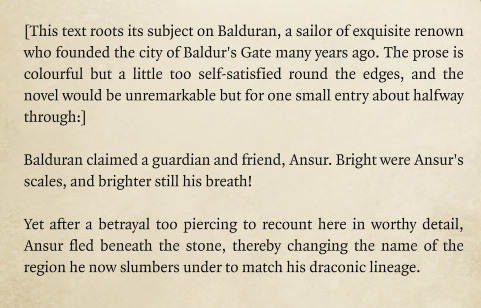
The note preceding the author's writing gives the distinct impression that the author is - yes - an unreliable narrator. They are not only giving a secondhand account of the events, but they are dramatizing that account.
Then, after defeating Ansur, the player finds the following letter on Ansur's body:

We also have additional story from The Emperor itself about the events that led to Ansur's death.
The reality is that Ansur, motivated by his love for Balduran, saved The Emperor from its enthrallment by the Elder Brain in the hopes of restoring the Balduran he knew and loved. Despite being asked over and over to stop, despite The Emperor's insistence that it was content with its new form, Ansur doggedly searched for a way to return The Emperor to its previous form as Balduran. Rather than accept that Balduran's new form was permanent, rather than accepting him as The Emperor, rather than being happy enough that his loved one was no longer a slave and that the memories of their time together were still intact, Ansur was not satisfied. He could not look past Emp's Illithidness, he could not let go of the narrative that Illithids are monsters. His refusal to adjust his paradigm, his unwillingness to accept The Emperor as a valid friend or ally or lover, was a failing on Ansur's part, and it was incredibly selfish.
Emp's letter to Ansur is incredibly heartfelt, and focuses entirely on Ansur and his happiness. Emp clearly still values Ansur and wants him to be contented. Even as Emp draws its boundaries, it keeps the focus on Ansur's well-being. It is a really good letter, and nothing about it implies that Emp held any ill will toward Ansur. It simply wanted Ansur to give up the pursuit of reclaiming Balduran as he was. But Ansur was unwilling to do that. So unwilling, in fact, that he felt it would be better to kill The Emperor rather than accept its new form.
Therein is the true betrayal: attempting to kill your friend while they're sleeping because you can't make them fit your ideal of them is, put simply, super fucked up.
The idea that it's a betrayal for The Emperor to have killed Ansur in self-defense, but Ansur attempting to murder Emp in its sleep is somehow not a monumental betrayal, is absolutely wild to me. Ansur was the one who betrayed The Emperor, and his rage is as misguided as the hate players have for Emp. I think players are blinded by the heroic narrative around Ansur, and the narrative that Illithids - and, by proxy, The Emperor - can't be trusted undermines the explanation that The Emperor gives. Players want to believe Ansur despite the evidence that his feelings of betrayal are unfounded, because they're naturally more inclined to trust a heroic figure than an Illithid. Again, I think this was a place in the game where players were challenged to question accepted narratives.
Of course, it's entirely possible that Ansur's attempt to kill The Emperor was driven by something entirely separate from the story we're offered in the game. Maybe Ansur took issue with The Emperor's movements with the Knights of the Shield; though that would beg the question of why he would be so determined to eliminate Emp and not any of the other members. Or, maybe Emp killed Ansur unprompted in a bout of pure Illithid malice, which would be a betrayal indeed - though that seems highly unlikely after reading its letter to Ansur. Ultimately, however, without any indication otherwise, we have to take the story we're given at face value. As far as we know, Ansur was motivated to kill The Emperor as part of his cognitive dissonance around its change from Balduran to The Emperor, and that selfish, misguided act constitutes a betrayal of Emp by Ansur, not the other way around.
The Emperor's Return to the Netherbrain:
I saved this for last, because it's actually very simple. When you choose to free Orpheus, The Emperor declares its intention to return to the Brain, and true to its word it does exactly that, and fights against you during the final battle. Why, after fighting so hard to avoid the Brain, would Emp so willingly return to it?
Put simply, because it has no choice. Or, it has no choice in the context of the game as-is. What reason does Emp have to believe that Orpheus, an avid enemy of Illithids, having been subjugated by this Illithid, would be willing to extend his protection to it?
Emp knows that the moment Orpheus is free to give or take his psionic protection, he will refuse to protect it. The jig is up. The game is over. In its pragmatic way, The Emperor concedes defeat. Its anger is palpable, you have forfeit its hard-won freedom. But the cards are on the table, and it knows that without Orpheus' protection it is going to be enthralled whether it wants to be or not. So it goes willingly. At least it can make one more choice before it loses its autonomy.
Final Thoughts:
There is so much more to say about The Emperor and its feelings and motivations. Again, in no way is it a good-aligned character, and even with the best outcomes it's still clear that Emp is at least somewhat driven by a desire for greatness, whatever form that greatness takes. That was true even when it was Balduran. But I do think it's worth remembering that when you foster a positive connection with it and side with it for the endgame, it regards your parting with some sentimentality, and then just...leaves. It's all fairly benign. The player's choices go a long way in influencing how malicious The Emperor is, and I think that's important to remember.
I could go on for hours about this, it is absolutely one of my hills to die on, but I think this is enough for now lol. I just wish The Emperor were respected more as a complex, compelling character. I wish it were at least afforded the same defiant love some of the villains are given. I genuinely hate to see Emp flattened and written off when it's such an amazing character!
123 notes
·
View notes
Text
@falsesighted cont.
“Oh, bite me.” Jari readied himself in his usual form, legs spread but firmly planted to keep his balance. He does a flamboyant twirl of his spear and he readies. His grip of the spear is firm and controlled. He keeps his eyes on Halsin’s…although this is mainly done to distract himself from the man scantily clad figure. He begins to move to the right, beginning to circle the large elf before going in for a swift jab to his side. However, that was merely bait for his next move of going for the back of Halsin’s knee. The smile is on his lips as they get started.
The curl of his smile didn't waver, even as his wizard companion spat. "I was thinking claws first. Eager, are we?" The teasing tone of a wood elf was all too natural. Au naturale, even. It was a good thing most of the groan-worthy jokes stayed in his head...(most of the time). Made his mental plane quite incompatible with those illthid parasites, he supposed.
No stranger to the laws of battles within nature, having had plenty in wild form to know better, the Archdruid readily returned Jari's gaze as the circling persisted just long enough for them to loop around another once before the surge of action via the other's jab inspired him forward. With a tilt upwards, the pole still positioned in the exchange between forearm and triceps lifted just so to catch the blow as gentle as two hands cupped and waiting to cushion a ball thrown from the other side of camp before it could go splash in the river and ruin Scratch's evening.
So gentle was it a reaction, in fact, that a slight turn was in order to meet the blow aimed from the back of his knee as well- reaction reserved with just the amount of force one exerts while clasping a hand to fiddle with it fondly. A quirked brow and a cautious blink let the wizard know he at least had his attention now.

"You're quick~"
0 notes